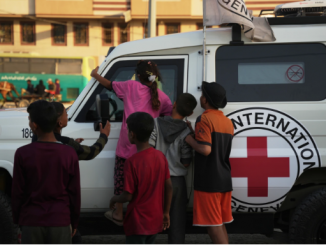
| Published June 1, 2025
Islamic Revolutionary Guard Corps (IRGC) also warns that Israel will receive a ‘devastating and decisive response’ if it attacks Tehran.
As diplomatic efforts between Iran and the United States reach a critical juncture, Tehran has issued stark warnings against any potential Israeli military action targeting its nuclear facilities. Iranian officials have declared that such an attack would not only provoke a decisive response but could also ignite a widespread regional conflict.
Foreign Minister Abbas Araghchi emphasized that the United States would bear legal responsibility for any Israeli aggression, citing the close alliance between Washington and Tel Aviv. In a letter to UN Secretary-General António Guterres, Araghchi stated, “Iran strongly warns against any adventurism by the Zionist regime of Israel and will decisively respond to any threat or unlawful act by this regime.”
The Islamic Revolutionary Guard Corps (IRGC) echoed this sentiment, warning that Israel would face a “devastating and decisive response” if it proceeds with an attack. IRGC spokesperson Alimohammad Naini remarked, “They are trying to frighten us with war but are miscalculating, as they are unaware of the powerful popular and military support the Islamic Republic can muster … .”
These warnings come amid reports suggesting that Israel is preparing for potential strikes on Iranian nuclear sites. CNN reported that U.S. intelligence has observed Israeli preparations for such actions, though it remains unclear whether a final decision has been made.
As Iran and the U.S. prepare for a fifth round of nuclear talks in Rome, deep disagreements persist, particularly over Iran’s uranium enrichment activities. While Washington insists that Iran halt enrichment to prevent the development of nuclear weapons, Tehran maintains that its nuclear program is solely for civilian purposes. Araghchi warned that if the U.S. aims to end uranium enrichment entirely, there would be no nuclear deal.
The situation remains tense, with Iran indicating that it may take unspecified “special measures” to protect its nuclear sites if threats continue. These could include halting cooperation with the International Atomic Energy Agency (IAEA) or relocating enriched uranium to undisclosed locations.
As the international community watches closely, the potential for escalation underscores the fragile state of Middle Eastern geopolitics and the critical importance of diplomatic engagement to prevent conflict.
The implications of Iran’s warnings and the heightened tensions over its nuclear program are serious and wide-ranging, both regionally and globally:
1. Increased Risk of Regional War
-
Iran’s declaration of a “decisive response” to any Israeli strike raises the risk of a direct military confrontation. If Israel attacks, Iran may retaliate not only against Israel but also U.S. bases or allies in the region.
-
Neighboring countries like Lebanon (via Hezbollah), Syria, Iraq, and Yemen (via the Houthis) could be drawn into a wider conflict, destabilizing the region further.
2. Strained U.S.-Iran Relations
-
Iran warning that the U.S. would be held responsible for Israeli actions could derail the already fragile nuclear negotiations.
-
If talks fail, Iran may accelerate its nuclear program, leading to more sanctions and possible covert or overt action by the U.S. or Israel.
3. Global Energy and Economic Impact
-
Any conflict in the Persian Gulf—especially involving Iran—could threaten oil exports through the Strait of Hormuz, disrupting global energy markets and driving up prices.
-
This could worsen inflation and economic instability in energy-dependent nations.
4. Diplomatic Fallout and Shifting Alliances
-
The U.S. may face increased pressure from both allies and adversaries to rein in Israel or reach a deal with Iran.
-
Countries like Russia and China may use the crisis to expand influence in the Middle East by supporting Iran diplomatically or economically.
5. Nuclear Non-Proliferation at Risk
-
A collapse of negotiations or an Israeli strike could cause Iran to exit the Non-Proliferation Treaty (NPT) or expel IAEA inspectors.
-
This could trigger a regional arms race, with countries like Saudi Arabia potentially pursuing their own nuclear programs.
Overall Takeaway:
The mounting tensions between Iran, Israel, and the U.S. over Iran’s nuclear program have pushed the region closer to a potential military confrontation. Iran’s warnings reflect both a defensive posture and a diplomatic pressure tactic amid stalled nuclear talks. With high stakes for regional stability, global oil markets, and non-proliferation efforts, any miscalculation could ignite a broader conflict—making continued diplomacy not just preferable, but essential.
SOURCES: REUTERS – Iran warns Israel, US against any attack on its nuclear sites
AL JAZEERA – Iran says will hold US responsible for any Israeli attack on nuclear sites
THE TIMES OF ISRAEL – Ahead of new round of talks with US, Iran warns Israel against attacking nuclear sites
THE DAILY TRIBUNE – Iran to hold U.S. responsible for Israel attack





Be the first to comment